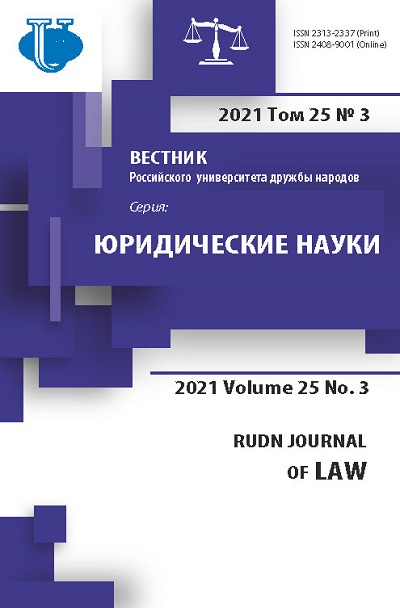Features of exercising control over economic concentration: the experience of Russia, France and USA
- Authors: Egorova M.A.1,2,3
-
Affiliations:
- Kutafin Moscow State Law University (MSAL)
- Russian State Academy of Intellectual Property
- International Alliance of lawyers and economists
- Issue: Vol 25, No 3 (2021)
- Pages: 654-672
- Section: CIVIL LAW
- URL: https://journals.rudn.ru/law/article/view/27223
- DOI: https://doi.org/10.22363/2313-2337-2021-25-3-654-672
Cite item
Full Text
Abstract
The relevance of the topic is due to the comprehensive development of digital technologies and the need for timely legal regulation of new phenomena of public life. Digitalization is not only rapidly penetrating all sectors of the economy, but is a trigger for the creation of qualitatively new economic relations. The digital transformation of the economy and markets, in addition to objective advantages, also carries negative consequences. Negative manifestations are possible in the monopolization of commodity markets. Antitrust laws are changing in line with the expansion of digital markets. The article identifies the main obstacles to regulating monopolies in the digital economy. The practice of antimonopoly regulation of digital platforms is considered. The tasks of adopting the fifth antimonopoly package as expanding the scope of the Federal Law “On Protection of Competition” are outlined. In addition, the concept of economic concentration is analyzed, as well as signs of restricting competition when considering transactions in its conditions. Particular attention is paid to differences in approaches to regulating the digital market in Russia, France and USA. A comparative analysis of the antimonopoly legislation of Russia, France and USA, types of economic concentration, regulations for control over concentrations at the level of different jurisdictions has been carried out. The phases of control over economic concentration, the powers of the antimonopoly authorities, the assessment of criminal encroachments on competition are considered in detail.
About the authors
Maria A. Egorova
Kutafin Moscow State Law University (MSAL); Russian State Academy of Intellectual Property; International Alliance of lawyers and economists
Author for correspondence.
Email: maegorova@msal.ru
ORCID iD: 0000-0002-0227-8845
Doctor of Legal Sciences, Full Professor, expert of the Russian Academy of Sciences, Head of the International Cooperation Department, Professor of the Competition Law Department, Kutafin Moscow State Law University (MSAL); expert of the Center for scientific and expert analysis, Institute of Scientific and expert-analytical activity, Russian State Academy of Intellectual Property; co-President, International Alliance of lawyers and economists (France) Duflot & Associates Law firm
9 Sadovaya-Kudrunskaya str., Moscow, 125993, Russian Federation; 55a Miklukho-Maklaya str., Moscow, 117279, Russian Federation; 106, rue Edouard Herriot, Lyon, 69002, FranceReferences
- Carlton, D.W. & Heyer, K. (2020-2021) Assessing the Revolution in Antitrust. Regulation. Winter2020/2021. 43 (4), 24-29. (in Russian).
- Dyukarev, V.V. & Migacheva, E.V. (2020) Economic concentration under the Influence of Public Administration. Business Security. (5), 26-29. (in Russian).
- Greenfield, L.B., Lange, P.A. & Calln, N. (2020) Antitrast populism and the consumer welfare standard: what are we actually debating? Antitrust Law Journal. 83 (2), 393-428.
- Hemphill, C.S. & Grimmelmann, J. (2020) Law and TechnologyWhat Role for Antitrust in Regulating Platforms? Communications of the ACM. 63 (5), 36-38.
- Ivanov, A.Yu. (2018) Merger review in the digital age: episode one in discussions on the fifth competition law reform package. Zakon. (2), 106-119. (in Russian).
- Kinev, A.Yu. (2013) Administrative and legal bases and organization of protection of competition in the Russian Federation: monograph. Moscow, Elite Publ. (in Russian).
- Loboda, A.E. (2013) Problems of Antimonopoly regulation: administrative and legal aspect. Modern competition. 6 (42), 48-53. (in Russian).
- Marinescu, I. & Posner, E.A. (2020) Why has antitrust law failed workers? Cornell Law Review. 105 (6), 1343-1394.
- Melamed, A.D. (2020) Antitrust law and its critics. Antitrust Law Journal. 83(1), 269-292.
- Petrov, D.A. (2016) Joint Venture Agreements as a Legal Form of Conglomeratic Economic Concentration. Competition Law. (2), 28-32. (in Russian).
- Petrov, D.A. (2018) Relationships of Connection (Affiliation) as a Generic Concept in the Antimonopoly Regulation. Competition Law. (4), 12-15. (in Russian).
- Pisenko, A.K. (2010) Development of administrative law: from mechanisms for countering local speculative monopolies to a modern system of antimonopoly regulation. Moscow, RUDN Publ. (in Russian).
- Popondopulo, V.F. (2017) Review of the monograph “Economic Concentration: Experience of Economic and Legal Research of Market and Legal Constructions. Publishing editor Egorova M.A. M., Yustitsinform. 2016. - 552 p.” written by a group of authors Vaypan V.A., Gabov A.V., Egorova M.A., Kinev A.Yu., Petrov D.A. Competition Law. (2), 45-47. (in Russian)
- Puzyrevsky, S.A. (ed.). (2019) Competition law: textbook. Gavrilov D.A., Puzyrevsky S.A., Seregin D.I.; Moscow, Norma: INFRA-M Publ. (in Russian)
- Seregin, D.I. (2020) Features of merger control through acquisition of fixed assets and intangible assets. Journal of entrepreneurship and corporate law. (1), 29-34. (in Russian)
- Starikov, A.V. (2020) Civil law means of protection against antitrust law violations. Vestnik ekonomicheskogo pravosudiya Rossiiskoi Federatsii. (6), 4 -78. (in Russian).
- Tenreiro, D. (2021) How I Learned to Stop Worrying and Love Big Tech. National Review. 73 (1), 24-27.
- Tolochko, O.N. (2016) Institute of the competition protection in national and international law: experience, problems, prospects. Izvestiya vysshikh uchebnykh zavedenii. Pravovedenie. 6 (329), 151-163. (in Russian).
- Vasil’eva, A.F. (2012) Service state: an administrative and legal study of the provision of public services in Germany and Russia: monograph. Moscow, RAP Publ. (in Russian).
- Vinchkovskiy, E.V. (2020) On the concept of “execution of a contract” within the framework of state control over economic concentration. Russian Competition Law and Economy. 4 (24), 28-35. doi: 10.47361/2542-0259-2020-4-24-28-35 (in Russian).
















